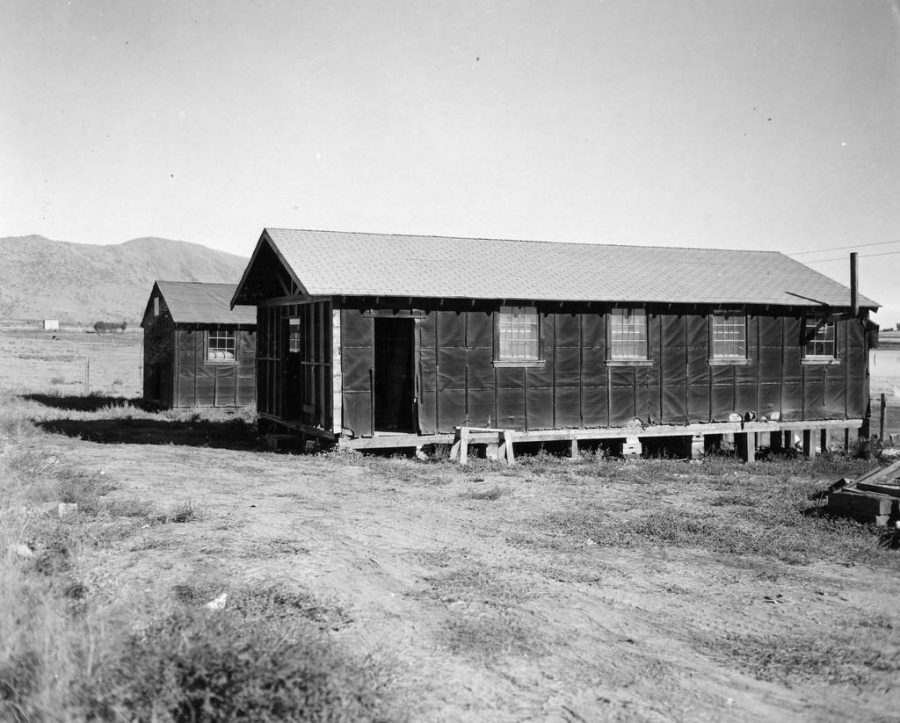My upbringing was defined by distrust and hyperbole. I was raised in a home that valued independence and privacy, hid emergency food storage in the basement, and nursed a vague distrust of a large, centralized government. These values likely stem back to my Mormon pioneer ancestors who sacrificed their former lives for their religion and crossed the unforgiving American wilderness to pursue a dream of peace and prosperity. The psychological scars from being the target of a Missouri Extermination Order and repeatedly chased out of town have a compelling hold on the Mormon cultural memory and have left us wary of state-sanctioned violence against the oppressed.
Of course, that depends on who the definition of “the oppressed” refers to. In my experience, my community spent so much time looking for and inventing signs that white, fairly educated, suburban middle-class families were under systemic attack, I was often left wondering if we would even notice oppression happening to anyone else.
In our Suburban Oppression Olympics, some version of Godwin’s Law always seemed to manifest. “Godwin’s Law” is an Internet-age adage that predicts that if a discussion goes on long enough, someone will eventually go nuclear and compare someone or something to Hitler, Nazism, or the Holocaust. I grew up with several regular offenders—Planned Parenthood, paperwork for gun ownership, political correctness, you name it. I even remember an incident where neighborhood parents compared themselves to Jewish people hiding in Germany because they couldn’t get a staff member at a local elementary school fired because he was gay. The problem with Godwin’s Law is that it’s inherently ridiculous—it’s used to describe situations that are nowhere near the gravity of trafficking people, locking them up in cages, and deeming their existence illegal.
That is, until a country does just that. As of April 6, 2018, the Trump Administration launched a “zero tolerance” policy for illegal immigrants, ripping thousands of children from the arms of their parents—some of them ending up behind chain-link fences, housed in deserted Wal-Marts decorated with murals of the president’s face with a quote from his ghost-written “Art of the Deal” slapped underneath. While previous presidents–specifically President Obama–share responsibility for the creation of these facilities, it is only under the Trump Administration that children have been separated on such a mass scale.
If that’s not uncomfortable enough, President Trump has demonstrated open animus towards religious individuals, tailoring a ban to filter them out of the immigration process because they are Muslim. Despite being upheld by the Supreme Court as constitutional, it is undeniable that the president called “for a total and complete shutdown of Muslims entering the United States until our country’s representatives can figure out what the hell is going on” during rallies. From the beginning, he has demonstrated clear racial animus–and is now making good on his campaign promises.
While Godwin’s Law has also been applied to these actions, it remains too far to compare President Trump’s current immigration crisis to the height of the Holocaust. Its similarities to early fascism might be more fitting, but it shouldn’t be forgotten that America has set a similar precedent of its own. The Trump Administration’s inhuman, nationalistic vitriol spits a familiar poison with its parallels to the internment of Japanese-Americans during the mid-1940s. Their internment is one of the greatest stains on American history. Innocent Americans and their children were racially targeted, dubbed the enemy and thrown behind fences, some of them detained at the “Topaz War Relocation Center” in Utah. It was not a question of arriving legally in the United States then, and it isn’t now, not when the Trump Administration plans to revoke the naturalization of citizens.
While one would think that the glaring overreach of Executive Order 9066 is obvious (considering President Reagan signed a formal apology in 1988 and conventional wisdom would imply that the ethics of incarcerating people en masse rarely hold up over time) it appears that history reflects itself in ugly ways. Offensively enough, Korematsu v. the United States, the Supreme Court case upholding President Roosevelt’s authority to intern Japanese-Americans, stood for 74 years before being overturned, only to be rectified while immigrants from Muslim majority countries are barred entry per President Trump’s travel ban and families from south of the border sit in sweltering camps. Historical parallels indeed.
While public outrage pushed the Trump Administration to renege on family separation, Americans ought not to become complacent. It’s easy to reach the consensus that five-year-olds shouldn’t be dragged from their mothers and forced to represent themselves in court, yet public complacency is what made this possible in the first place. This zero tolerance policy should never have made it this far.
As for the people of Utah, we should have overwhelming empathy for the Muslim refugees fleeing violence and the migrants who cross thousands of miles to seek asylum—Utah was founded by people who did both. This state is filled with the literal and spiritual descendants of Mormon pioneers, a people found in violation of U.S. law and described as dangerous by those consumed by fear. If people have the energy to claim that Common Core is going to turn their children into Hitler Youth, they ought to be alarmed by stories of migrants who were told that their children are being taken away for a bath, only to have them never returned. There should not be a sniffy letter to the editor in The Salt Lake Tribune that writes off Trump’s child detention centers as “beautiful facilities more like a summer camp for the youth” when white suburban America once said the same thing about the Japanese American children playing baseball behind barbed wire at “relocation centers”. Utahns have inherited a unique legacy from the pioneers that built this state, and it ought to be used to defend the liberties of the truly oppressed.




Ivet Oliver • Aug 23, 2018 at 8:55 pm
Trump forgets that his mom was an immigrant and he was married to 2 immigrants, including his present wife. Separating children from parents is the utmost absurd and a proof of totally heartless person. He does not have the manners of a president and has embarrassed the United States in many occasions. If he wants to make America Great, it needs to start with him!!!
Brad Bleak • Aug 23, 2018 at 5:05 pm
You’re conveniently ignoring actual history, the LDS pioneers did plenty to push Native Americans out of “their Zion” & although one could argue they didn’t have literal blood on their hands from the Bear River Massacre, they were quite happy to get rid of their, “Indian problem” in the Cache valley.
This empathy you want from the LDS community wasn’t there when they settled the Beehive State, the ultimate irony that people who once were legally attacked in Missouri (Missouri law supported pushing Mormons out by any means necessary) went to similar means to settle the Utah Territory in their own version of manifest destiny.
I agree that the LDS population should have more empathy in general, but I also think you are discounting how helpful this community (LDS, and all Utahns) is towards the refugee population. It’s too easy to take one sniffy comment on the SL Trib to make a blanket statement about all of us (journalistic platitudes like this happen too often, especially in opinion pieces).
I’m LDS, I’m empathetic towards refugees (but think that we need a good legal immigration system because this has been an issue for many other POTUS’ than the current one) & I know our history….and it’s filled with hypocrisy and irony (and a lot of good stuff)…just like the history of most human beings who are willing to confront the truth through an honest lens while still celebrating all the good & recognizing all the struggles that also took place.
Aaron McDonald • Aug 23, 2018 at 9:21 am
This article begins with a criticism of a people, who are mostly conservative, as being irrationally prone to exercising “Godwin’s Law.” It then proceeds to exercise a slightly watered down variation of Godwin’s Law in opposition to those people (i.e., “maybe it’s an overstatement to call Trump a Nazi, but we can certainly call him a fascist.”)
I’m sorry you grew up in a house rife with hyperbole and political oversimplifications. But taking your bad intellectual/political upbringing and applying it on the other side of the debate, with slightly more nuance, doesn’t help the political conversation. Perhaps, if there wasn’t the assumption that the right has terrible intentions then actual conversations could be had.
Rusty Henrichsen • Aug 22, 2018 at 5:57 pm
I feel very much like you do, Elise.